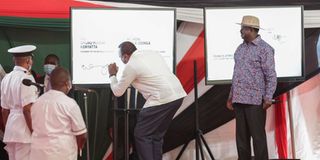BBI reggae and Uhuru’s bid to salvage his complicated legacy

President Uhuru Kenyatta and ODM leader Raila Odinga lead Kenyans in signing the BBI form during the National launch of the BBI signatures collection exercise at KICC in Nairobi County.
What you need to know:
- It is a lot easier to assemble allies in a day to canvass support for BBI than it is to spur investment in manufacturing in two years, without reliable electricity and in an economy mired in record debt.
- It is easier to ignore striking doctors and nurses during a pandemic than lay the infrastructure for delivery, let alone guarantee, universally affordable health cover for struggling majority Kenyans in five years.
Mr Raila Odinga dominated the political arena in 2020 as he did in 2018 and 2019 and is likely to do in 2021. As I say, he is the unelected powerhouse, much more powerful now than he ever was as premier.
The President took leave after the Independence Day fete, and when he resumes duty next month, he will have two years left on his tenure. What legacy will he bequeath Kenyans?
The detente with Mr Odinga, Building Bridges Initiative (BBI), the imminent referendum and change of the Constitution, are part of President Kenyatta's legacy. It is tied, hand in glove, with Mr Odinga's ambition for the 2022 General Election.
Rewind. Three years ago last month, Mr Kenyatta took the reins of power and announced a four-fold legacy-bound development agenda. To wit, affordable housing, enhanced manufacturing, food security and nutrition, and universal health coverage.
This blueprint swiftly hit turbulence. Failed presidential candidate Odinga, calling the incoming government illegitimate, launched a public boycott of marquee businesses, including telephony giant Safaricom, edible oils-maker Bidco and milk processor Brookside.
Violence
Alongside were the weekly demonstrations that were guaranteed to incite violence, and ensure anxiety and instability after two filth-filled presidential polls. Then, Mr Odinga and associates threatened secession. That was seditious.
And Mr Odinga took resistance to an unprecedented level: He swore himself in as parallel head of state. It was as provocative and direct a challenge to President Kenyatta as it was treasonous. Ultimately, Odinga's resistance to, sabotage of, and animosity for, the government forced the President into doing a deal instead of invoking the nuclear option and arresting and arraigning Mr Odinga on charges of sedition and treason.
To save the government and economy, the President blinked. He chose to do a Lyndon B Johnson and have Mr Odinga "inside my tent pissing out than outside my tent pissing in." Mr Odinga, like the proverbial camel, wants more.
So how does Mr Kenyatta's Big Four agenda square with BBI? It is much easier to make a success of BBI reggae (politics) in a day than build 500,000 housing units in five (not one) years in a depressed economy.
It is a lot easier to assemble allies in a day to canvass support for BBI than it is to spur investment in manufacturing in two years, without reliable electricity and in an economy mired in record debt.
It is easier to ignore striking doctors and nurses during a pandemic than lay the infrastructure for delivery, let alone guarantee, universally affordable health cover for struggling majority Kenyans in five years.
Kenya remains food insecure 57 years after independence. Put simply, the Big Four will not be achieved. One, Kenya's economy was struggling before the coronavirus struck and forced the country into lockdown.
Lockdown shuttered livelihoods, shattered purchasing power and increased unemployment and, therefore, crime. Recovery will take a long time. Granted President Kenyatta moved swiftly and decisively to fight the pandemic and that is part of his legacy. But he could do more.
Developing vaccines
From the experience gained, he could introduce legislation and policy which would, one, ensure Kenya will always be prepared, complete with rapid response units, to protect the populace against a pandemic and an economic recovery fund.
Two, Kenya contributed immensely to researching Aids and developing drugs for it. President Kenyatta should consider legislation and policies that would establish Kenya as a leader in researching viruses and developing vaccines and therapeutics.
Three, new legislation or policies should target reform of learning so that while the classroom remains central, Kenya should introduce new ways of learning which could be deployed whether or not the classroom situation is compromised.
Four, politicians do not fight graft. Politicians use wars on graft, phoney or real, to fight rivals. President Kenyatta may consider policy that removes politics and politicians from fighting graft.
Last: "We need to deal with this monster if we are to develop this nation, otherwise sooner or later we will become a nation that only collects taxes to pay ourselves."
That was in March of 2014. The President was talking about Kenya's bloated public wage bill. It remains bloated. But can be fixed in a day.




